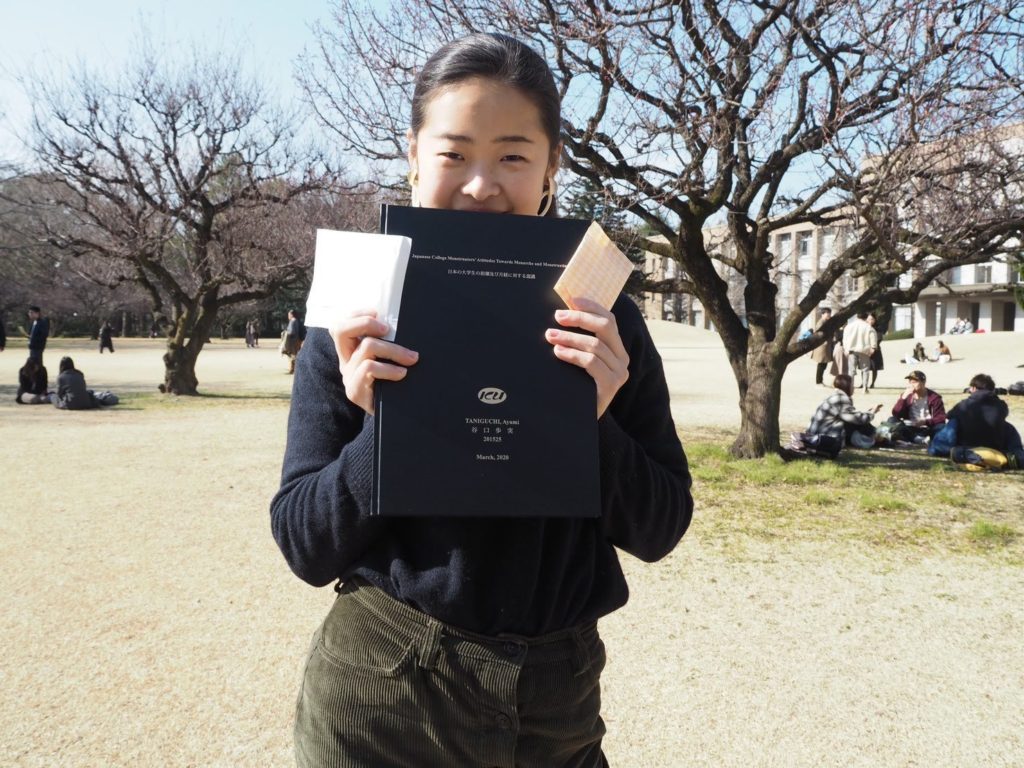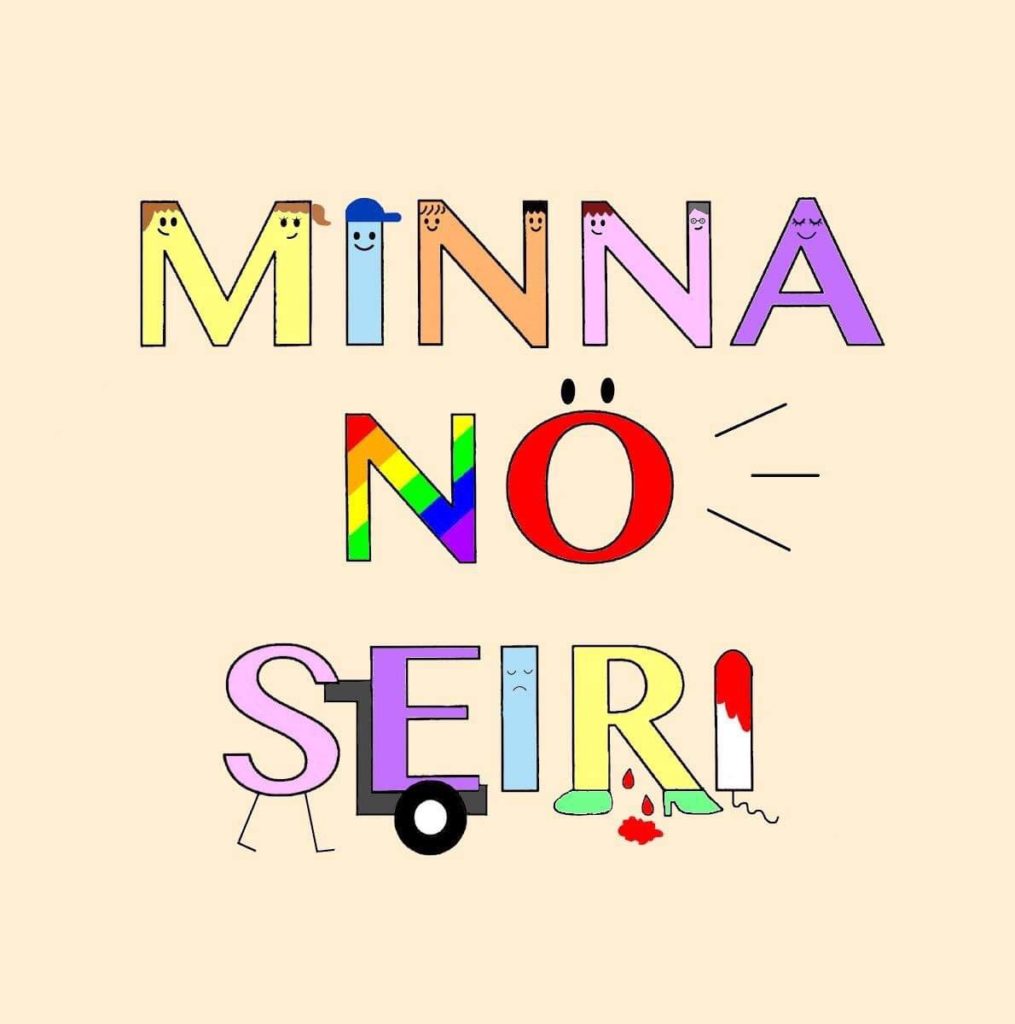An ICU Graduate Campaigns to Reduce the Tax Rate of Period Products
For interview vol. 9 we interviewed activist Ayumi Taniguchi, an ICU graduate (ID20) who is campaigning to reduce the tax rate of period products and dispel stigmas about periods, mainly using social media as a platform. She told us why she decided to start an online petition, her thoughts and findings from being vocal about periods, and about various social issues stemming from menstruation.
*The words “man/men” and “woman/women” are used in this article for clarification purposes.

Q1. Please tell us about your activism.
Through leading the menstruation movement, I aim to create a society where everyone can be themselves and live freely and safely, by focusing primarily on including period products in the reduced tax rate system.
I always keep in mind that menstruation is everyone’s problem, because not all women have periods, and vice versa.
Q2. What exactly do you do in your activism?
There are three pillars to my activism.
The first is abolishing stigma about periods. We hold a #minnanoseiri (everyone’s period) online cafe once a month to talk about periods with people, and post YouTube videos of our members continuing that discussion among ourselves. I believe there is power in being vocal, and I hope it’ll prompt more people to start thinking about periods.
The online cafes are based on themes like menarche (the first menstrual cycle) and sex education. Since talking about sex is often considered taboo (especially in Japan), I feel that stereotypes about period symptoms are widespread. I want to create opportunities to discuss personal anxieties about menstruation and let people know that not everyone has the same symptoms.
It’s great when we make events open to everyone, to all genders, because I can confront my own stereotypes too. Men in their 50s and 60s would join, wanting to understand and face their own stereotypes, and I realised that it’s wrong to presume that 50 year old men wouldn’t be interested in these topics. I’ve also had participants saying they want a society where they don’t need to be open about periods. This made me realise that, in an ideal society, people would understand without needing to be told how hard periods are.
The second one is investigating the current reality of menstruation. This includes, for example, the financial burden and accessibility of period products and how the products are handled during a crisis situation. Although I haven’t started this yet, most of the information is still in the dark, so I’d like to look into it bit by bit.
The third one is making period care accessible. This is centred around reducing the tax rate of period products, which started with the online petition campaign. Now I’m trying to contact politicians in order to hand the petition over to the government. I aim to make period-related care more accessible than before.
Q3. When did you start your activism?
While writing my senior thesis, I began to think about the huge financial burden of buying period products, and started the petition campaign in December in my senior year. It was a bit lonely working on my own, so I started inviting friends around the start of this year, and our organisation #minnanoseiri officially kicked off this February.

Q4. What motivated you to start doing this?
The main reason is because I wrote about menstruation for my senior thesis, but I initially started taking interest in menstruation when I learned about period taboos in a class called “Anthropological Studies of Inequality”. I realised then that this was the topic for me.
My motivation probably comes from my grandmother struggling to get period products due to poverty. She came to Tokyo as a university student, and not having enough money to buy period products, she had to skip eating breakfast the next day. I couldn’t believe one had to skip breakfast for essential products, and the story had stayed in my mind ever since.
I do this with the hope that people don’t have to suffer simply because they have periods, a natural physical feature, like my grandmother did.
Q5. What initially made you interested in feminism and gender studies?
I’m a Taylor Swift fan, but around the time I entered university, she was starting to get slut-shamed a lot. This made me realise how wrong male/female double standards are. I ended up double-majoring in gender and sexuality studies and education.
Q6. How did you feel when you started?
It was partly spontaneous, because I just felt it was wrong that people born with a uterus are forced to bear this burden. My passion was my drive, so looking back now, I hadn’t really come up with a detailed action plan…
Since reducing the tax rate of period products isn’t such a controversial topic, there is relatively little backlash, and I don’t find my activism difficult. Even when I receive backlash, it is usually missing the point so it doesn’t really bother me.
Q7. When do you feel a sense of achievement?
I feel glad I started my activism when people tell me how they hadn’t thought of this problem before, or how wrong they thought the situation was, or that they were grateful for being able to talk about menstruation, a topic that is not often discussed. Menstruation is something to be hidden in society, so there aren’t many opportunities to discuss it openly. I’m glad that I’m able to bring individual needs and opinions into the light, little by little.
The majority of event participants are mothers and older people, but there are also young people and men in their 50s who want to think about how they should act in the workplace, who want to know more because they think menstruation is something men should think about as well.
I hope I can provide opportunities to question what we’ve come to accept as normal, especially the social reality that women’s bodies are being taxed.
Q8. What have you learned from your experience so far? What do you want ICU students to know?
I realised that no matter how isolated you may feel at the start, many people will offer a helping hand. You may doubt yourself, like you are the only one who thinks this is a problem, but support will come once you start, so don’t be afraid to speak up. University student activists tend to receive a lot of attention. I’ve also noticed that you’ll find many ICU students invested in activism.
Q9. What are the advantages of focusing on menstruation for your activism?
A broader focus may widen my area of activism, but since menstruation is an important topic connected to many social issues, it provides a wide range of opportunities. Focusing on one topic makes it easier for people to visualise the issue and understand how important it is.
Q10. What’s your message for society?
Reducing the tax rate of period products from 10% to 8% will only lower the price of one pack by a few yen. We must consider the significance of this difference and the social implication of a reality where the financial burden of period products is an individual responsibility that people with periods must bear. We must also consider why period products were not included in the reduced tax system (whether people who’ve had periods were in decision-making positions) and how bodies that can menstruate and become pregnant are viewed in society (views like “periods must be privately dealt with in public spaces” and “periods must be controlled because they affect productivity in the workplace”).
Talking about it as a normal, relatable issue and undoing stigmas by spreading accurate information makes society a better place. That’s why sex education is so crucial.
Q11. When the coronavirus pandemic started, there was a huge rush to buy up period products. What are your thoughts on this as an activist?
A shortage of period products is of course problematic. However, because it happened right after people started panic-buying toilet paper, it was a chance for people to realise that period products are just as essential as toilet paper.
It also became clear that the socially vulnerable tend to be those who have periods, so I think it was an opportunity to think about how to protect the marginalised under a state of emergency.
Q12. What do you hope to achieve? Any plans for the future?
We’d like to achieve our goal of including period products in the reduced tax system, which we’re working on now. We also want to create equal access to period products by increasing the number of places you can get them for free and holding events to tackle period stigmas. My ultimate goal is a society that provides support for periods, where period products are distributed for free. If any ICU students are interested, please feel free to contact me!